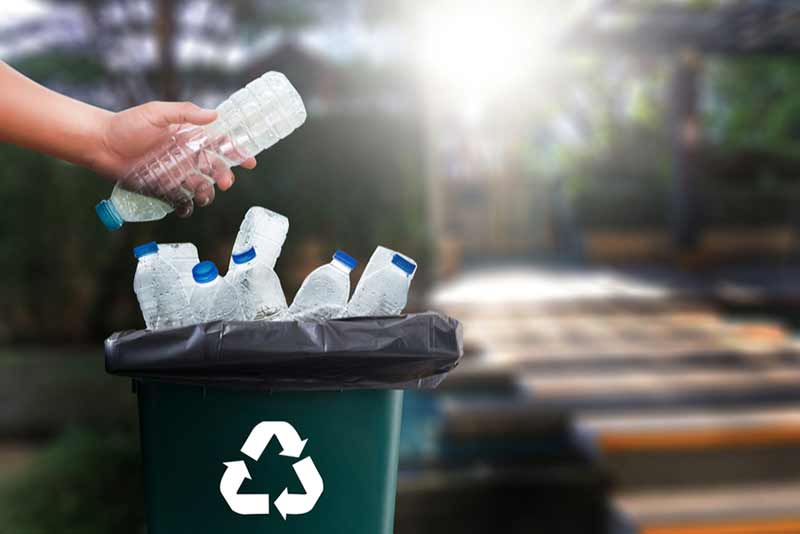Manufacturers Must Reduce Commercial Waste with Better Recycling
The wheels of government are turning to push through the latest environmental bill and commercial waste legislation that will make suppliers think twice about their manufacturing processes as well as their waste disposal. After all, the environment was a hot topic in the last general election and now it’s time for the politicians to put their money where their mouths are!
Why is recycling important?
Currently, it’s thought that 67% of plastic waste in the UK comes from product packaging and with more than 90% of UK businesses managing their commercial waste poorly and failing to reach recycling targets, it’s time to make a stand. Poor use of recycle bins and waste compactors is damaging our natural surroundings and giving businesses that don’t look after their own waste a bad name.
| Plastic Domestic & Commercial Waste Production in UK* |
| 2014 | 4.9 million tonnes |
| 2018 | 5.2 million tonnes (estimated) |
| 2030 | 6.3 million tonnes (forecast) |
| 2018 – 2030 | + 21% (forecast) |
Confusion concerning domestic cardboard and plastic waste collections has been blamed for the drop in UK household recycling from 45.2% in 2017 to 44.7% in 2018.
Without the introduction of new legislation, waste will continue to increase. So as technology at recycling centers improves, it’s time to put recycle bins, cardboard compactors and plastic balers to better use.
What is the new Environmental Bill?
The new Environmental Bill calls for more durable, recyclable product design, as well as tighter monitoring and digital tracking of waste disposal and transit. Businesses not complying with the stricter waste management rules will be prosecuted and fined.
Current commercial waste legislation is directed by the EU, so Brexit could mean that the UK waste disposal rules will fall behind the rest of Europe. Other countries with higher standards may not want to trade with UK-businesses and our standards of living may fall. The new bill will create an Office for Environmental Protection to ensure that the UK waste disposal systems stays in line with, if not ahead of, the rest of Europe.
Legislation will not only cover businesses but also means that local councils must provide more effective and simple waste collection and recycling for households throughout the whole of the UK. This should be backed up with education on why is recycling important and instruction on how ordinary residents can help achieve cardboard and plastic recycling goals.
The National Assembly for Wales is also currently debating proposed environmental regulations that will help businesses to reach a target of 70% waste recycling by 2025. These new waste management rules will make landfill and the incineration of recyclable waste illegal, with a promise from Welsh Authorities to prosecute offenders for criminal offences.

How will this new Environmental Bill affect commercial waste recycling?
Sticking to the new recycling guidelines will:
- reduce the amount of commercial waste produced
- give businesses who employ the use of recycling bins, rubbish compactors and balers a better reputation
- make businesses more attractive to prospective clients and employees who value considerate waste management
- lower costs through reduced consumption and cheaper waste disposal costs.
Working alongside the existing Packaging and Packaging Waste Directive, which aims for a 2030 recycling target of 55% plastic recycling, 75% glass reuse and 85% paper and cardboard recycling, the new Environment Bill will put pressure on manufacturers to separate and recycle waste for a better, greener future for us all.
Under the new Environment Bill, we’ll find more ethical waste disposal initiatives, such as
- increased incentive for producers to separate using recycling bins and recycle waste with the help of industrial waste compactors
- deposits for returning re-usable products, like glass bottles to recycling centers
- charges for all single-use plastics, similar to the carrier bag scheme
- simplified and standardised kerbside recycling schemes that are the same for every region
When will the new Environmental Bill come into effect?
The new legislation was originally on track to become an Act of Parliament on the 31st December 2020. However, when a general election was called, all parliamentary actions were halted, so we are currently waiting for the bill to be considered by the new government. The COVID-19 pandemic has also caused some delay in progressing the bill.
In the meantime, any businesses introducing the manufacturing and recycling procedures recommended by the bill, as well as introducing waste balers and rubbish compactors will still experience cost savings by reducing the use of unnecessary raw materials and benefitting from cheaper waste disposal costs by employing more recycling methods.
How can phs Wastekit help with the new waste collection and recycling rules?
New recycling targets can be reached with help from experienced waste disposal providers, such as phs Wastekit and its industrial waste compactor machines and recycle bins. We can advise on any new recycling legislation, ensuring that your business keeps up to date and avoids any penalties. Our free Wastesaving Audit will identify areas in which your business could benefit from plastic or cardboard compactors and balers, allowing your business to effectively sort and store commercial waste until it is sent for recycling.
We can also inform you of industry-wide recycling projects, such as the Holy Grail, which is developing watermarks that can only be seen under ultraviolet light. This aims to make identifying recyclable plastic easier, further reducing time and effort required to sort domestic and commercial waste and increasing recycling rates.
All sizes of businesses will be targeted with the waste disposal rules of the new Environmental Bill. In fact, many of the largest manufacturers are already supporting various waste recycling initiatives in order to avoid penalties for generating commercial waste, when and if the legislation progresses.
References:
*https://www.wwf.org.uk/sites/default/files/201803/WWF_Plastics_Consumption_Report_Final.pdf
https://www.letsrecycle.com/news/latest-news/producers-to-pay-full-costs-bill-confirms/
https://www.newscientist.com/article/2221072-uk-governments-post-brexit-environment-bill-comes-in-for-criticism/
https://researchbriefings.parliament.uk/ResearchBriefing/Summary/CBP-8712
https://www.openaccessgovernment.org/companies-recycling-policy/54334/